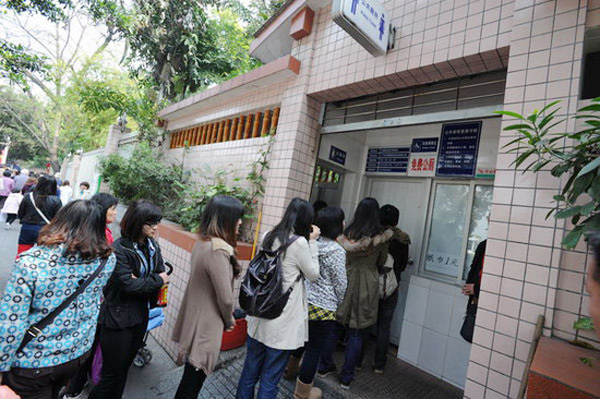
A group of women wait outside a men's public toilet cubicle in Guangzhou city, South China's Guangdong province during an "Occupy Men's Toilet" movement on Feb 19, 2012. The move is to call on the government to provide more public toilet cubicles for women. [Photo/CFP]
More women's restrooms will be constructed in public places in Shanghai in upcoming years and the ratio of men's facilities to women's will be targeted to at least 1-to-2 to give the ladies more convenience.
Toilets at public transportation hubs, cultural and shopping centers, commercial streets, scenic spots, parks, and cinemas will follow the standard that is being revised and will be put into use this year, according to Zhang Feng, director of the Shanghai City Appearance and Environmental Quality Monitoring Center. The ratio of the facilities for the two genders, which may even reach 1-to-3 ideally no matter the facilities, will be built new or reconstructed from existing restrooms.
Shanghai, where the population is nearly three times that of New York City, has more than 8,700 public toilets, including those on the street, in public venues and in rural areas.
"The toilets in public venues outperformed the other two types in the ratio of facilities for the two genders but still stands at 1-to-1.19. It's obvious that women have to queue up in front of the restrooms on many occasions," Zhang said.
He made the remarks during a media briefing on Tuesday when the Shanghai Municipal Women and Children Committee published a report on the ratio of men's and women's restrooms in public places.
The report showed that at some places, the ratio of the facilities in the city fails to meet current standards, which were laid down in 2007. For example, more than 70 percent of the restrooms in metro stations fail to reach the stipulated ratio of 1-to-1.5.
The report said that more than 40 percent of the women respondents in the survey said they often find the toilets are fully occupied when entering a public restroom, and nearly two-thirds of them said they have to wait between one to five minutes before their turn.
"As a man I support the plan of increasing women's toilets as well. Each time when my wife and I go to the women's restroom and men's at the same time at public venues, say a shopping mall or hospital, I have to wait several minutes before she comes out," said Zhong Tao, a 33-year-old Shanghai resident.
The committee said that promoting the rebuilding of more facilities to render more toilets to women according to the actual flowrate of people has become a part of its draft of the 13th Five-Year Plan, which is being reviewed by the municipal authority.
Family restrooms, where there is space for parents and children, changing tables for infants and handrails for the elderly or disabled users, have also been put in the draft.
Actually a total of 85 such restrooms where seniors can be accompanied by their spouse or children, and young children can have assistance from a parent of the opposite gender, were constructed in the municipality last year. Another 200 such restrooms will be newly- built or rebuilt from existing facilities this year, Zhang said.
"It's great news. My husband and I used such facilities several times when I needed to change the diaper for my baby and breastfeed her," said Dai Zhexin, the mother of a 13-month-old girl in Shanghai.
Shanghai Shentong Metro Group, the construction and operation manager of subway systems in the city, said it was mulling building one family restroom with a toilet and a washbasin for children and a changing table for infants at each subway station.







